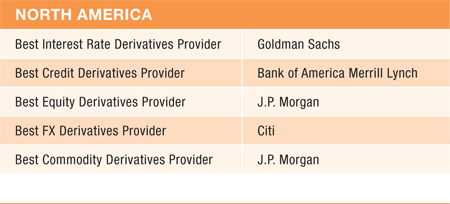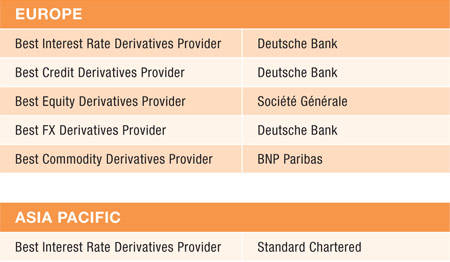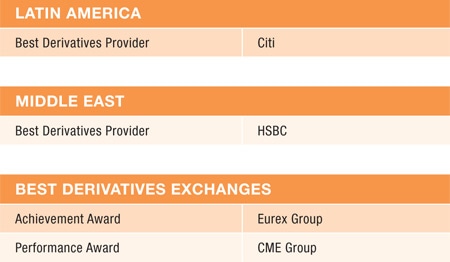LEARNING TO LIKE VANILLA
By Gordon Platt
Global Finance presents its annual awards highlighting the best global derivatives providers.

Reform and regulation of the derivatives markets is having a major impact on the functioning of the industry and the types of contracts available to buyers. Without a doubt, in the future there will be more standardized contracts that will be traded on exchanges and centrally cleared. These “vanilla” derivatives trade at narrow spreads, and they are the most liquid contracts.
Some 40% of the notional value outstanding in over-the-counter derivatives markets is already cleared, and a further 39% could be cleared, according to a study by the TABB Group, a financial markets research firm. The most exotic and customized products, which make up the remaining 21% of derivatives, are unable to be cleared, it adds. These exotic contracts are nonstandard and infrequently traded.
“Central clearing will play a critical role in correcting long-standing flaws in market structure caused by overconcentration of exposures among a relatively small number of dealers,” according to the TABB Group study, which was commissioned by the World Federation of Exchanges.
Four banks dominate in derivatives contracts held by insured US commercial banks, according to the comptroller of the currency. The top four banks—J.P. Morgan, Citi, Bank of America and Goldman Sachs—hold a combined 93.2% of the total.
Basel III capital requirements are likely to make clearing more capital-efficient than the alternative, TABB Group says.The introduction of central clearing is expected to result in lower margins, increased collateral requirements and a general increase in the cost of doing business in areas such as OTC derivatives. This is the cost of systemic protection, TABB Group says. “To mandate clearing and margin requirements during an era of deleveraging (which means collateral is becoming painfully scarce) is a very bitter pill to swallow,” it adds.
By early next year, many standard interest-rate and CDS products will be required to be cleared. Gary Gensler, chairman of the US Commodity Futures Trading Comission, said: “Bright lights of transparency will shine, dealers will come under comprehensive regulation, and standardized swaps between financial entities shortly will be centrally cleared. The public will benefit, and our markets will be stronger in this new era.”
Effective regulations will need to be global. The EU is taking a similar approach to the US’s, although there are important differences. Europe doesn’t have the Volcker Rule restricting the proprietary trading activities of banks, for example. It’s unclear how many G20 countries will adopt regimes similar to those of the US and the EU for regulating derivatives. Implementation timetables will also differ because of varying legislative processes.
As the global risk-transfer arena continues to evolve, Global Finance has selected the World’s Best Derivatives Providers. Two exchanges were also recognized for their accomplishments. The criteria used in selecting the winners included volume, market share, scope of global coverage, customer service, commitment to the business, pricing, technology and execution skills.




NORTH AMERICA
BEST INTEREST-RATE DERIVATIVES PROVIDER: Goldman Sachs
Interest rate derivatives account for about $35 trillion of Goldman Sachs’ $43 trillion of notional amount of derivatives contracts. These instruments are the largest component of the global over-the-counter derivatives market.
BEST CREDIT DERIVATIVES PROVIDER: Bank of America Merrill Lynch
Credit derivatives are used to transfer the credit risk of an underlying loan. According to the comptroller of the currency, credit derivatives represent 6% of total derivatives notional amounts held by insured US banks. Bank of America holds $3.56 trillion of credit derivatives, of which $2.41 trillion are investment-grade instruments.
BEST EQUITY DERIVATIVES PROVIDER: J.P. Morgan
J.P. Morgan’s $71.5 trillion notional amount of overall derivatives contracts is the largest such holding of any US bank. J.P. Morgan holds $408 billion of equity derivatives, more than twice the level of its nearest US competitor. Although the bank has a strong global presence in equity derivatives, it is still smarting from big losses in credit derivatives by its London-based chief investment office.
BEST FX DERIVATIVES PROVIDER: Citi
With the largest global presence of any foreign exchange bank, Citi helps clients manage currency risks worldwide. Its Exposure Management module enables clients to track their global cash flow and balance-sheet exposures to determine if the hedges they have put on globally across subsidiaries are in line with their corporate hedging strategy.
BEST COMMODITY DERIVATIVES PROVIDER: J.P. Morgan
J.P. Morgan’s global commodities group is one of the biggest in the industry. It offers market-making, structuring, risk management, financing and warehousing services. J.P. Morgan does not make directional bets on commodity prices and executes trades only on behalf of clients.
EUROPE
BEST INTEREST-RATE DERIVATIVES PROVIDER: Deutsche Bank
Deutsche’s strong credit profile has helped it solidify its position as Europe’s top interest-rate derivatives provider. The bank moved early to introduce a new clearing service for over-the-counter derivatives in 2011. It is also using more two-way credit support annexes for mutual posting of collateral to minimize counterparty risk for derivatives that are not centrally cleared.
BEST CREDIT DERIVATIVES PROVIDER: Deutsche Bank
Deutsche is the leading provider of credit derivatives in Europe. Credit derivatives include credit default swaps, forwards and options on CDSs, bespoke credit guarantees and total return swaps. Last year Deutsche Bank executed the first fully electronic CDS trades using the Tradeweb platform owned by Thomson Reuters.
BEST EQUITY DERIVATIVES PROVIDER: Société Générale
SG’s corporate and investment bank has maintained its strength in equity derivatives in recent years, demonstrating its commitment to the business. The bank is a leader in single-stock and equity index options, as well as exotic equity options with complex rules determining payouts.
BEST FX DERIVATIVES PROVIDER: Deutsche Bank
Deutsche is the world’s largest FX bank by market share. With its strong balance sheet, Deutsche Bank offers customized solutions that include options in addition to forward contracts. Its dbOverlay product allows asset managers and corporates to reduce the time and cost of hedging FX risk.
BEST COMMODITY DERIVATIVES PROVIDER: BNP Paribas
BNP Paribas offers a wide range of commodity-hedging services, including futures and clearing. The bank has reduced its trading assets in the past 12 months, as it shifts to a more client-focused business model. BNP Paribas introduced an exchange-traded commodity product in June that is linked to an index.
ASIA PACIFIC
BEST INTEREST-RATE DERIVATIVES PROVIDER: Standard Chartered
Standard Chartered is the leading bank for interest rate derivatives in Asia. Its interest rate products range from vanilla swaps to structured products and hybrid derivatives. Standard Chartered was admitted as a clearing member when Singapore Exchange began central clearing of over-the-counter financial derivatives in November 2010.
BEST CREDIT DERIVATIVES PROVIDER:BNP Paribas
BNP Paribas has greatly increased the range of its product offerings, including liquidity management and yield enhancements, becoming the best credit derivatives provider in Asia. It has developed onshore credit derivatives markets in China and India and bases its credit-structuring activities for the region in Hong Kong.
BEST EQUITY DERIVATIVES PROVIDER: Société Générale
The structured equity derivatives team of Société Générale is included in the cross-asset solution platform of the bank. Most equity markets in the region were relatively flat over the past year, but SG offered its clients the opportunity to capture volatility spikes with its Vinci Index, which has a negative correlation with equities.
BEST FX DERIVATIVES PROVIDER: HSBC
HSBC played a significant role in the development of the offshore renminbi market, where it offers deliverable and nondeliverable forward, FX swap and FX option products. The bank is active in FX derivatives globally in both developed and emerging markets. With operations in 19 Asian countries, HSBC has a large pool of regional currencies from which it can draw.
BEST COMMODITY DERIVATIVES PROVIDER: Macquarie
Australia’s Macquarie combines the knowledge of a commodities trader with the balance-sheet strength of a financial institution to offer a range of unique financing solutions. From ethanol to metals and mining, and including agricultural commodities, Macquarie offers competitive pricing on a wide variety of derivatives.
LATIN AMERICA
BEST DERIVATIVES PROVIDER: Citi
With an extensive regional presence and a global platform, Citi is the leading provider of derivatives and risk-management tools in Latin America. The bank offers swap-driven funding solutions for regional companies outside of their home market. Last year Citi introduced an over-the-counter derivatives service that handles the increasingly complex operational and reporting requirements under new regulations.
MIDDLE EAST
BEST DERIVATIVES PROVIDER: HSBC
HSBC has the largest presence in the Middle East of any international bank. HSBC Amanah, based in Dubai and with representatives in Riyadh, structures financial solutions that are compliant with shariah. Speculation is forbidden under Islamic law, and derivatives may be used only for hedging. HSBC is cutting back some of its retail Islamic banking operations.
BEST DERIVATIVES EXCHANGES
ACHIEVEMENT AWARD: Eurex Group
The international derivatives markets of Eurex Group, owned by Deutsche Börse, traded an average of 10.2 million contracts daily in September, of which 7.5 million were Eurex Exchange contracts and 2.7 million were contracts traded on the International Securities Exchange (ISE). The first all-electronic options exchange in the US, the ISE offers trading on more than 2,000 underlying products.
PERFORMANCE AWARD: CME Group
US financial regulators designated CME Group recently as “systemically important.” The group plans to open a derivatives market in London to compete with Liffe and Eurex for the business that is shifting from the over-the-counter markets to exchanges and central clearinghouses. CME Europe will open next year with 30 foreign exchange futures.
 GLOBAL RISK MANAGEMENT PROVIDERS 2012: LEARNING TO LIKE VANILLA
GLOBAL RISK MANAGEMENT PROVIDERS 2012: LEARNING TO LIKE VANILLA



